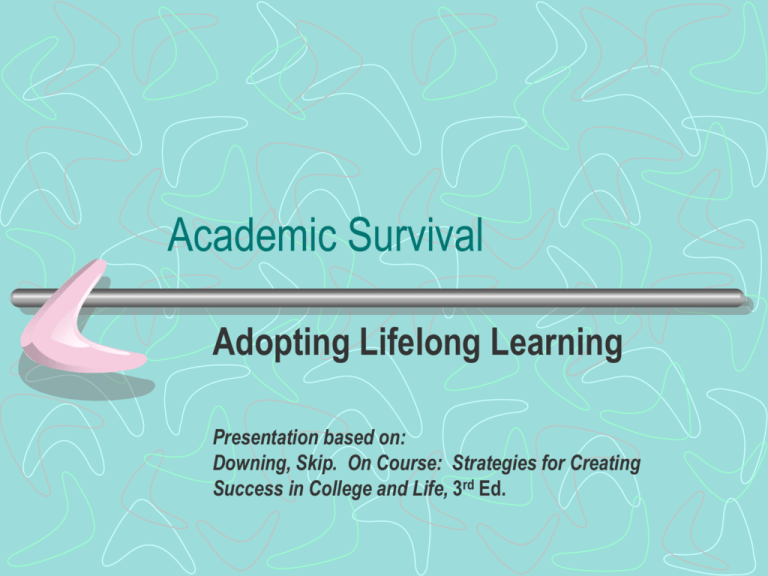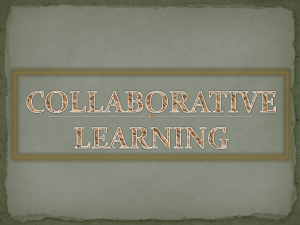Chapter 7
advertisement

Academic Survival Adopting Lifelong Learning Presentation based on: Downing, Skip. On Course: Strategies for Creating Success in College and Life, 3rd Ed. Lifelong Learning Successful Students Struggling Students Discover their preferred learning style, applying the effective and joyful process they used as young children to learn valuable new information and skills. Often experience frustration, boredom, or resistance when given the opportunity to learn new information or skills. Lifelong Learning Successful Students Struggling Students Learn to make course corrections, giving them the flexibility to revise outdated behaviors or beliefs that limit their effectiveness. Hang on to ineffective behaviors or beliefs even when these get them off course. Lifelong Learning Successful Students Struggling Students Develop wisdom from the University of Life, using problems, obstacles, mistakes, failures, and even catastrophes as valuable learning experiences. Grapple with one adversity after another without discovering the valuable life lessons they have to teach. Preferred Learning Styles The natural learning process Step One: Ask motivating questions. Quest for knowledge! Step Two: Gather relevant information. Step Three: Discover meaningful answers. Self-Assessment: How I prefer to learn? Do you prefer to: 1. 2. 3. 4. Think Do Feel Innovate Thinker Learners Motivating Questions: What? Preferred Ways of Gathering Information: Ponder facts and theories. Preferred Ways of Discovering Meaning: Logical argument and facts. Thinker Learners Thinkers can enhance learning by: 1. Constructing important “what” questions and searching for answers. 2. Construct other types of questions – how? who? why? what if? 3. Read all textbook assignments carefully. 4. Organize lectures & reading notes in logical fashion, using outlines and study charts. 5. Study with classmates who have different preferred ways of learning 6. Ask the instructor important “what” questions. 7. Ask professors to list important points on the blackboard. 8. Ask professors to suggest additional readings in the subject. Doing Learners Motivating Questions: How? Preferred Ways of Gathering Information: Action, hands-on. Preferred Ways of Discovering Meaning: Objective tests, logical progressions, confirming facts. Doing Learners Doers learn best by: 1. Constructing “how” questions and searching for answers. 2. Constructing other types of questions – what, who, why, what if? 3. Practice using course information or skill outside the classroom. 4. Organize lectures & reading notes in step-by-step fashion, outlines, study charts. 5. Study with students who have different preferred learning modes. 6. Ask instructor to answer “how” questions. 7. Ask instructor for practical applications of course materials. 8. Ask instructor to list important steps. 9. Ask the instructor to demonstrate skill in step-by-step fashion. 10. Ask instructor to observe you in step-by-step procedure and give feedback. Feeling Learners Motivating Questions: Why or who? Preferred Ways of Gathering Information: Personal connection and emotionally supportive environment. Preferred Ways of Discovering Meaning: Seeking answers that are personally meaningful. Feeling Learners Feeling learners enhance learning by: • Construct important “who” or “why” questions. • Construct other types of questions. • Discover the value of the subject for you personally. • Organize notes and study materials using concept maps. • Practice using course information or skills with people in your life. • Make friends in class. • Tape-record lectures. • Study with classmates who have different preferred learning modes. • Ask the instructor who and why questions. Feeler Learners 10. Ask the instructor to answer important who or why questions. 11. Ask the instructor to explain who you might make a personal application of the course information. 12. Ask the instructor to meet with you outside of class so you can get to know him/her better. 13. Ask the instructor to allow group work. Innovating Learners Motivating Questions: What if? Or What else? Preferred Ways of Gathering Information: Exploring new possibilities, new solutions. Preferred Ways of Discovering Meaning: Using personal imagination and intuition. Innovating Learners Innovating learners can enhance learning by: 1. Constructing “what if” and “what else” questions. 2. Constructing other types of questions. 3. Organize notes and study materials using concepts maps 4. Study with classmates with different learning modes. 5. Ask the instructor to answer your “what if” and “what else” questions. 6. Ask if you can design some of your own assignments. 7. Ask the instructor to use visual aids. 8. Ask the instructor to recommend a book for you to read by the most innovative person in the field. 9. Ask the instructor to evaluate you with essay questions or independent projects. Learning to Make Course Connections As individuals we often limit our ability to solve problems or face challenges because we refuse to look beyond what we think we already know to be the truth! •Test your present answers –no one can escape being tested or challenged, so simply try to learn all you can from each tests. •Heed feedback – Creators look for feedback in the results they have created in their lives. •Revise your answers – Creators are flexible and willing to revise selfdefeating patterns and limiting beliefs. Developing Wisdom •Learn from the curriculum of life – every single thing we live through teaches us something. Ask “how do I think?”, “how do I feel?”, “what can I do?” •Avoid learned helplessness - see obstacles and adversity as temporary, specific, and impersonal rather than permanent, pervasive, and personal. •Lessons from adversity – allow each obstacle, setback, or failure to be a life lesson – not a dream killer. Developing Self-Respect Before anyone else can love and respect you, you have to love and respect yourself. •Live with integrity •Keep commitments




